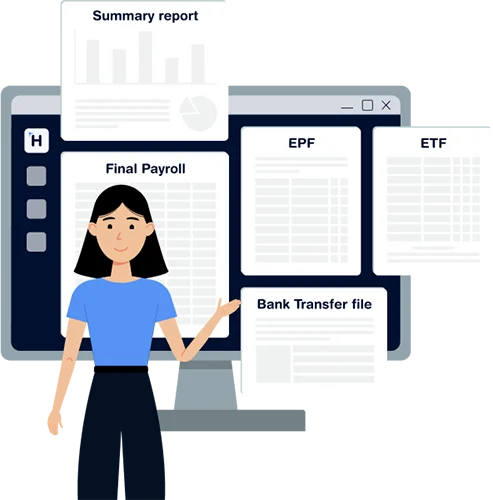Very little people know that there are provisions governing how you can make deductions to your employees’ pay. Historically, employment disputes concerning unfair pay cuts have ratted Sri Lankan courts. Employers have often used unfair deductions to keep their employees in order. This is why shop and office act has made provisions to make sure, if an employee is hired with the promise of a certain rate of compensation, his salary will not get reduced due to unfair deductions and retaliations inform of deductions. Let’s explore what these provisions are. As usual, the writer will use blue font extractions from the original act, allowing the reader to interpret these clauses.
The following extractions are from Part II, Payment of remuneration of the shop and office act, Section 19.
“19. (1) The employer shall comply with the following provisions of this section regarding the payment of remuneration to each person employed in or about the business of his shop or office:
(a) He shall, subject as hereinafter provided, pay such remuneration in legal tender directly to such person without any deduction other than an authorised deduction, as hereinafter defined, made with the consent of such person;
Provided that the aggregate of the deductions made at any one-time shall not exceed sixty per centum of the remuneration due;”
The act specifies that you cannot make a deduction any deductions other than what is authorised in this act. Any such deductions should be made with the consent of the employee.
You should also keep in mind that the deductions made in one pay-cycle should not exceed a total of 60% of the total remuneration
“Provided, further, that nothing in the preceding provisions of this paragraph shall affect or be deemed to affect –
- any deduction authorised to be made from such remuneration by the Income Tax Ordinance or the Iadand Revenue Act, No 4 of 1963, or the Inland Revenue Act (No. 28 of 1978), whichever is applicable, or any other written law; or
- any retention or payment of the whole or any part of such remuneration made in pursuance of, or in compliance with, any order, process or decree, made or issued by any court of law”
However, any deductions authorized by the above-mentioned acts or a decision in a court of law will remain unaffected by these clauses.
“For the purposes of this paragraph a payment which, immediately after remuneration is paid to any person, is made out of the remuneration by such person to his employer or to an agent of his employer shall be deemed to be a deduction from the remuneration.”
The act also defines that any payment made to the employer or an agent of employer, out of the remuneration even after the remuneration is paid is still considered a deduction.
“In this paragraph, “authorized deduction” means a deduction made in such manner and subject to such conditions as may be prescribed in respect of-
- any advance of money made to a person by his employer,
- any payment, which at the instance of a person, is made out of his remuneration by his employer to any person other than the employer or an agent of the employer in order to discharge any obligation of the person employed or for any other purposes, or
- any other prescribed matter.”
Described in the above extract is what is considered an authorized deduction. Firstly, if the employee was paid in advance from his remuneration ahead of the pay date. The employer is entitled to recover such amounts from the employee’s salary.
Another authorised deduction is when the employer pays an amount from the employee’s remuneration which was already an obligation of the employee.
This clause also includes a third catch all phrase, for any other legal literature that prescribes on the matter or any special permission that you may have obtained. A later amendment also provided clarification as to what is meant by “(iii) any other prescribed matter.” as seen below,
“18. Deductions from the remuneration of an employee may be made by the employer in accordance with section 19(1)(a)(iii) of the Act in respect of –
- any contribution which the employee desires to make to any pension fund, provident fund, insurance scheme, savings scheme or recreation club, approved in writing by the Commissioner and operated wholly or in part by the employer;
- the price of any food or any article of food or any charges for loading supplied or provided to the employee by his employer;
- the rent of any house provided for the employee by the employer;
- an amount required to be furnished as security by the employee, the amount of such deduction being not in excess of such percentage of the remuneration as may be approved by the Commissioner;
- an amount approved in writing by the Commissioner as a charge for any amenities or services provided for the employee by the employer;
- the price of any goods other than goods referred to in item (2), sold to the employee out of goods kept for sale by the employer at the place of employment or at any other place;
- any fine imposed on the employee by the employer in respect of any of the following acts or omissions:-
- absence from the work without reasonable excuse;
- late attendance at work without reasonable excuse,
- causing damage to, or causing the loss of goods or articles belonging to the employer, such damage or loss being directly attributable to negligence, wilfulness or default of the employee,
- slacking or negligence at work,
- sleeping on duty,
- wilful failure on the part of the employee to comply with any lawful order given to him in relation to his work,
- theft of goods or articles belonging to the employer, or fraud or dishonesty in connection with the employer’s business,
- intoxication during working hours,
- wilful insubordination or wilful breach or discipline,
- incivility to any member of the public who attends the employer’s premises for the transaction of business,
- malingering,
- interference with any safety devices installed in the employer’s premises,
- distribution or exhibition inside the employer’s premises, without the previous sanction of the person in charge of such premises, of hand bills, pamphlets, or posters, not relating to his employment,
- violation of instructions given for the maintenance of cleanliness in the employer’s premises,
- smoking in any part of the premises where smoking is prohibited by the employer;
- any loans taken by the employee from any fund managed wholly or partly by the employer;
- any payment made by the employer to any other person at the instance of the employee
- any interest chargeable on any loan referred to in item (8) or on any advance of money, made by the employer to the employee, the amount of such loan or advance being not less than the amount due to the employee as remuneration for the current remuneration period”
You should also make sure that the following clauses are taken into account when implementing the above deductions
“Provided, however, that –
(a) in the case of any deduction referred to in item (3), the amount of such deduction shall –
(i) in a case where the rental value of such house has been assessed by the local authority in whose area such house is situated, not exceed such rental value, and
(ii) in a case where no such assessment has been made, not exceed six per centum per annum of the capital expenditure incurred on such house;
(b) in the case of any deduction referred to in item (7)-
(i) the aggregate amount of the deductions made in respect of such fines at any one time shall not exceed five per centum of the remuneration earned by the employee during the period during which such fines are imposed, and
(ii) the amount so deducted shall be applied by the employer for such purposes as are beneficial for the employees, being purposes approved in writing by the Commissioner; and
(c) in the case of any deduction referred to in item (10), the interest charged shall not exceed six per centum per annum of the principal or of the amount advanced, as the case may be.”
If you remember that we discussed earlier that the act allows the employer to make payments on behalf of the employee, if the employee is already obligated to do so. The act has brought an amendment to clarify this matter further.
“19.
- No deduction from the remuneration of an employee shall be made by the employer in respect of any payment made by the employer at the instance of the employee to any other person in order to discharge any obligation of the employee or for any other purposes, unless the employee shall have made a written request in that behalf.
- Every such request-
- shall state –
- the name and address of the person to whom such payment is to be made,
- the amount to be paid,
- the date on which the amount is to be paid, and
- the purpose for which such payment is being made,
- shall be signed by the employee; and
- shall be made in the presence of two witnesses who shall subscribe their signature thereto.
- The employer shall obtain from the person to whom such payment is made a duly signed receipt in respect of such payment; and such receipt shall be made available to the employee for inspection, if a request is made in that behalf by him”
If you have made any payments on behalf of the employee, you have to make sure that you are collecting a receipt containing the above details from the receiving party. These receipts should then be recorded so that the employee can also inspect when need be.
“20. After making any deduction in respect of any advance of money made to the employee by his employer, being an advance of money paid out of the remuneration payable to the employee for the remuneration period, the other deductions, if any, shall be made in the order of priority set out in regulation 18.”
Now that we’ve discussed the instances where deductions are considered authorized and that the total deduction amount shouldn’t exceed 60% of the full remuneration of that employee, this clause explains that there is order of priority in deduction payments. Clause 20, dictates that advance payments should have the utmost priority as a deduction pay item and the other pay items will be ordered as it appears under clause 18 in the same act. (Please refer back to the deduction types)
“21.
- Where deductions are made under the preceding provisions of these regulations from the remuneration of an employee, the employer shall –
- in the case of any deduction in respect of any article sold to the employee, maintain a record containing –
- the name of the employee to whom such article was sold,
- the date on which it was sold,
- the price at which it was sold, and
- the dates on which recoveries were made in respect of such sale;
- in the case of any deduction in respect of any fine imposed by the employer, maintain a record containing-
- the name of the employee
- the date on which the fine was imposed,
- the reasons for the fine,
- the amount of the fine imposed, and
- the dates on which recoveries were made in respect of such fine;
- in the case of any deductions in respect of any security required to be furnished by the employee –
- maintain a record of such deductions, and
- furnish to the employee a receipt in respect of the amount so deducted; and
- in the case of any deduction in respect of any moneys advanced to the employee by the employer, maintain a record containing –
- the full name of the employee,
- the amount of money advanced,
- the date on which the advance was made,
- the dates on which recoveries in respect of such advance were made, and
- the signature of the employee in acknowledgement of the receipt of the advance.
- Every such record referred to in paragraph (1) shall be made available to the employee for inspection, if a request is made in that behalf by him”
Understanding the Shop and Office Act provisions regarding deductions protects both employers and employees. Employers can avoid legal disputes by adhering to these guidelines and ensuring deductions are fair and authorized. Employees are assured their salaries won’t be unfairly reduced and can seek recourse if necessary.
Remember, for a smooth and legal payroll process, it’s crucial to be familiar with authorized deductions and obtain employee consent whenever required. If you’re unsure about a specific deduction, consulting with a legal professional is always advisable. By following these regulations, employers can maintain a positive work environment and employees can be confident in receiving their fair compensation.



